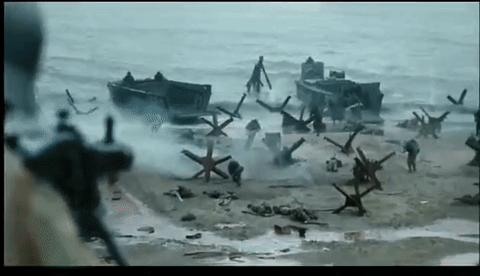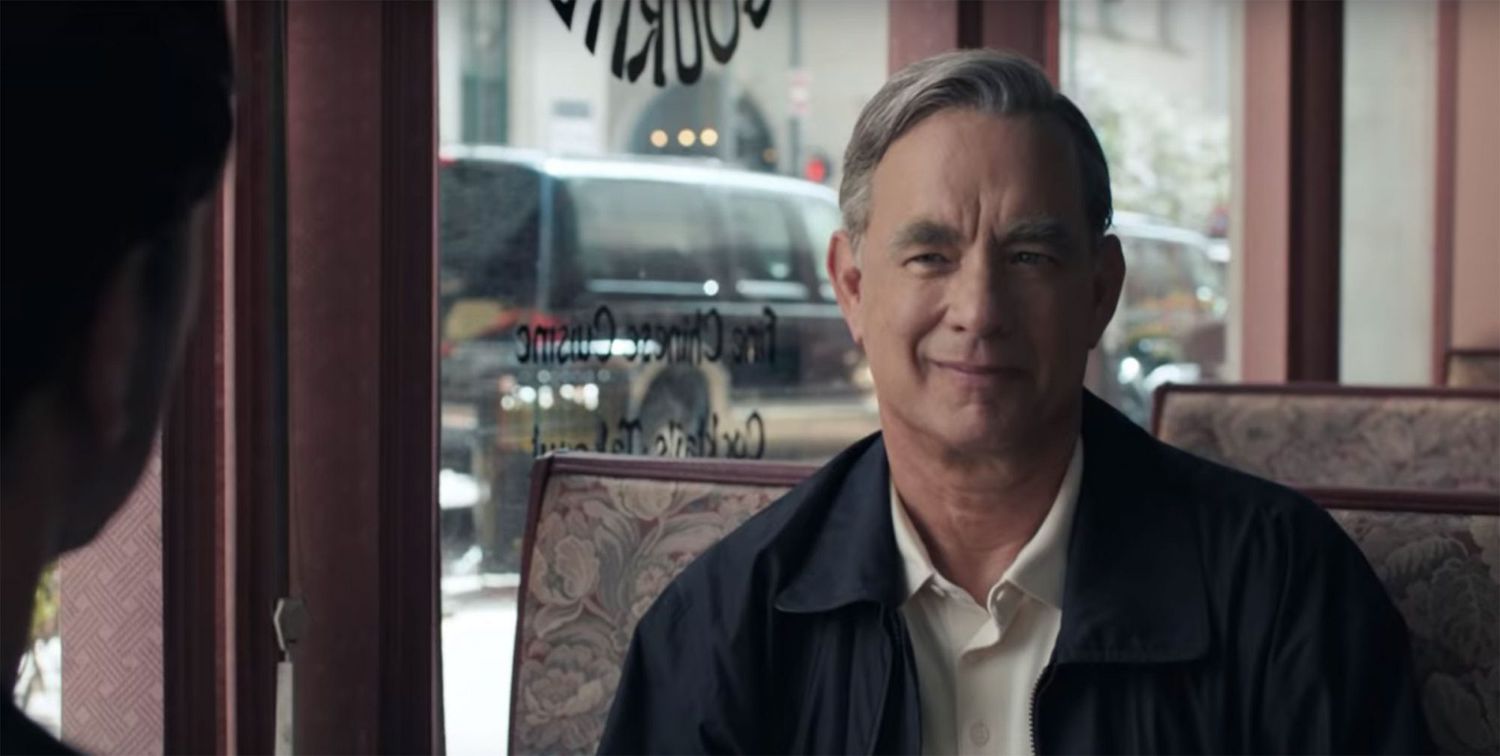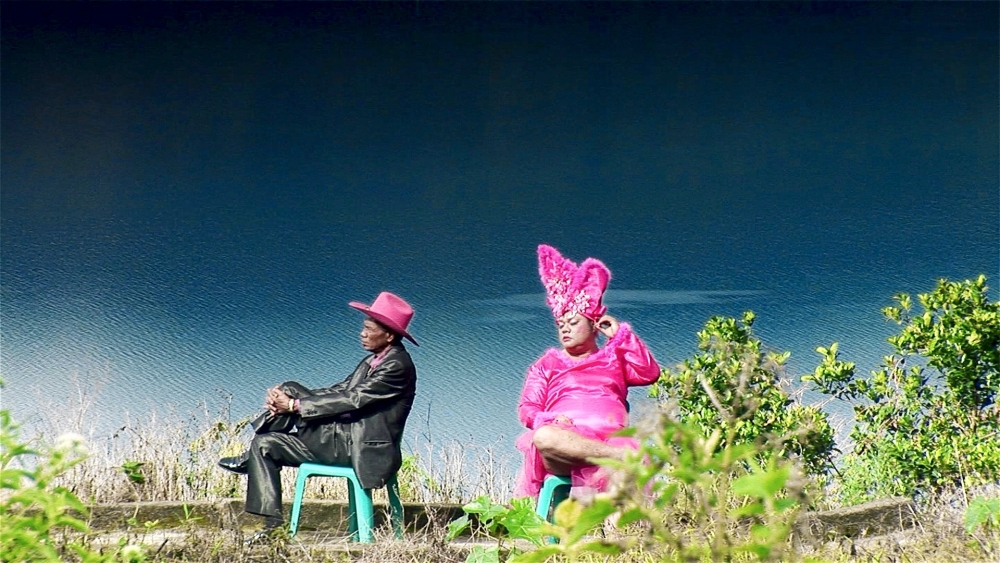
By sheer, unfathomable coincidence, I borrowed Saving Private Ryan from the library on June 6th, 2019. I’ve been listening to Unspooled, a tremendously entertaining podcast about the AFI 100, and when Paul and Amy finally got to Private Ryan, it occurred to me that I hadn’t seen it in more than a decade, and my wife had never seen it, so we agreed to watch it together this summer. Because I’ve had a lot on my mind and a lot on my plate, it literally did not occur to me that when I picked it up, I was doing so on the anniversary of D-Day itself. So the timing of when I watched it contributed a lot to how I experienced it, and my reflections on the experience are also thus shaded by my own contemporary political context.
Spielberg’s style in this film remains the most consequential thing about it. Calling back to the often grainy, washed-out footage of WWII documentaries, along with the handheld camerawork, Saving Private Ryan establishes for itself a certain kind of cinematic verisimilitude that, for the most part, has endured unmatched in the last couple decades. When I say “cinematic verisimilitude,” I’m placing the emphasis on cinematic. Pre-release hype really hammered on how realistic the film was, and that framing has remained dominant in discussion about the film.
Having never seen combat, I don’t know if it’s realistic or not. The violence is certainly unflinching, and Spielberg expends a lot of energy really selling how much it hurts to have a bullet in your gut or a shredded stump where a leg or arm used to be. The way he pulls out all the stops to sell that, though, is intensely movie-ish. He dials the sound mix up or down, lowering the incessant chatter of machine guns just long enough to hear a bloodied husk of a man calling for his mommy, then—shriek-BOOM!!!—another mortar explodes to your left, conveniently in time for Michael Kahn to cut to a body being ripped apart by the selfsame artillery shell. It’s all about whatever combination of image and sound Spielberg thinks will hit his viewer the hardest. Even in quieter moments, like a scene where the squad rests up in a church, there’s a hint of an echo in the larger space, making the monologues ever so much more lonely.
All of which is to say that Spielberg is a master craftsman, and it’s worth remembering just how fluently directors of his cohort speak film as a language unto itself. The register of of Private Ryan is informed by countless other war films. Unlike, say, Quentin Tarantino or Wes Anderson—two masters whose homages sometimes feel like they come with invisible endnotes detailing specific references—Spielberg borrows shamelessly but unerringly from the vast reservoir of cinematic grammar without trying to pull his audience into his own self-consciousness of the borrowing. A Tarantino or Anderson film often looks like a dazzling collage; a Spielberg (and Scorsese and Coppola, etc.) film often tastes like a savory stew. So the cinematic realism of Saving Private Ryan may or may not be historically accurate, but it is if nothing else a distillation of techniques that capture what most moviegoers remember of their wartime experiences, from The Battle of San Pietro to The Longest Day to The Guns of Navarone to All Quiet on the Western Front to Full Metal Jacket. You needn’t have actually been there. But if you’ve seen the movie version, Saving Private Ryan is the realest version of that.
Structurally, the film is pretty tight, with most character beats emerging from organic-feeling dialogue. And Spielberg populates his scenes with an insane number of recognizable faces, even in bits parts that exist purely for expository purposes. But there’s a lot of flab, too. There’s one scene where squad finds itself unexpectedly facing off against a bunch of Germans after a wall crumbles down. It’s tense, it’s a fairly effective reminder that there are no safe spaces in warfare, and it ends in a hail of gunfire. But it doesn’t really do anything to advance the plot or characterizations of anyone in the film. Even thematically, the idea that there are no safe spaces in war is carried through in literally almost every scene. It’s one of those scenes that is fine, it’s great, it seems fitting, but it probably could have been snipped out with nobody the wiser.
Even the Omaha Beach sequence—easily the most celebrated part of the film, and a tour de force—still feels a bit grafted on. I’m not sure if the film would work as well without it, but I’m not sure that it works so much better with it, either. The real story only picks up after the invasion has already been completed. With little difficult, I can imagine an alternate cut of this film which simply opens with the tracking shot of the bodies on Normandy’s beach, landing on one marked “Ryan,” followed by that car driving up the road to the Ryan household as the family matron collapses on the porch.
Shots like that, though, testify to the power that Private Ryan still has, even with the questionable decisions made about its structure. Very few, I suspect, will make the argument that this is Spielberg’s best film. However much he may have agonized in private over his creative decisions, Saving Private Ryan feels supremely confident, and it makes absolute sense in retrospect that the director who finally delivered the WWII statement he’d been refining for decades (Indiana Jones, 1941, Empire of the Sun) would immediately turn around and tackle one of Stanley Kubrick’s unfilmed projects—sure the kind of thing only an auteur sensing himself at the height of his powers could dare to do.
Spielberg struggled with World War II for most of his career, and since delivering Saving Private Ryan, he has not returned to it. I get the impression that his summary statement on the war is less about that war or war itself and more about how we wrestle with war. Do we wrestle with it? Do we weigh our actions? Can we justify a war by how we as a nation conduct ourselves when the war is over? And if the cost of the war is made legitimate by what we do with the victory, has the United States justified itself by its conduct since? In a way, I feel like Spielberg finished his struggle with WWII after Saving Private Ryan, and he ultimately suggests that his audience struggle with it a little more, too. Americans are not good at doing that. We don’t view war as a moral quandary; not as a rule.
At best, we tend to view war as worth it or not worth it, depending on how much blood or treasure it costs relative to the fruits of victory. The history books with which we flood our elementary and high schools certainly don’t question the moral legitimacy of fighting World War II or how we fought it. They don’t do that with any other war, either. We don’t measure our social progress against the volumes of blood spilled on the battlefield; not unless it’s to exalt America’s greatness.
After twenty years, I feel like it’s not much of a spoiler to recapitulate the finale. Tom Hanks plays a soldier, Captain Miller. He is fatally wounded in the climactic battle. Nearly all of his squad has also just perished trying to hold a strategic position against a German incursion. He and his men ventured deep into enemy territory to rescue a single man—the James Ryan of the title, played by Will Hunting-era Matt Damon—and when they found him, he refused to abandon his own squad. It’s because of Ryan, in essence, that Miller and most of his men have perished. His final words to Ryan: “Earn this. Earn it.”
Do you want to know what I heard echoing in my head as I heard those lines? “You had some very fine people on both sides.”
I think Spielberg displays a certain measure of fitting ambivalence toward war and even toward this particular war. He clearly signals his sympathy for the Allied side, of course. The film is bookended by a flapping American flag; his POV shots of the Germans render most of them as faceless agents of death, with a couple notable exceptions. When Miller and his second-in-command, Sgt. Mike Horvath (played by Tom Sizemore), debate just before the finale about pulling one good thing from this war, what we’re seeing is a decision for self-redemption for these hardened soldiers. Not that Spielberg owes equal time to the Nazis to engage in similar on-screen discourse, but this kind of conversation, held on the Axis side, feels utterly unimaginable in the world created in this film. It’s Americans who get a chance at redemption, and it’s an America family that wrestles with the legacy of the war at the film’s introduction and conclusion.
All of which is to say that the way Spielberg presents the film is often shorn of conventional patriotic trappings. War is a horror show punctuated by brief moments of grace. The one German who gets actual lines is first shown pleading for his life in pathetic, broken English after the squad loses its medic taking a bunker. Rather than conduct an illegal but expedient execution, they let him go. It’s this very German soldier’s bullet that ultimately kills Capt. Miller. If there’s an axiom guiding this film, it’s that no good deed goes unpunished, but it must be done anyway. The world is not made safe for democracy in Saving Private Ryan. The world is simply torn asunder like so much cannon fodder, and a lucky few survive to have the chance to earn the right to have benefitted from their own luck and the sacrifice of others.
This is not a film about how there were fine people on both sides. It’s a film that asks the audience to contemplate what cause could possibly make such violence worth it. I’m not sure that Spielberg (or his screenwriter, Robert Rodat) believe that any cause is worth that level of destruction. But I also doubt that any of the American soldiers who are shown getting stabbed, shot, blown apart, or otherwise bleeding out while screaming in agony would have braved those hazards if they’d believed that the Nazis were “fine people.”
Spielberg’s ambivalence is toward war, but we know from films like Schindler’s List that his ambivalence does not extend to Nazi ideology. To the extent that we can think of Oskar Schindler as a “fine person,” I guess that Spielberg might say that there were fine people on both sides of World War II. But the “fine people” on the Axis side actively worked to subvert or resist their regimes, or they at least evinced an internal conflict about the righteousness of their cause. Fine people try to smuggle Jews out of concentration camps. Fine people don’t cheer the racist demagoguery of the Nuremberg rallies. One can acknowledge the complicated nature of people swept up in turbulent political events without abandoning a basic moral compass that enables us to exercise a modicum of political judgment.
To praise the valor of a Nazi who gives his life for Germany’s right to commit genocide is like praising the courage of Confederate soldiers who fought to defend the slave states’ rights legally to protect slave ownership. You can acknowledge that many people are fine people within their own cultural contexts. But that doesn’t excuse us from passing judgments on those cultural contexts.
Saving Private Ryan doesn’t even bother to litigate the question of whether WWII was a just war. Nobody in the film questions that. By implication, Spielberg doesn’t question it, either. The war needs to be fought. The Axis powers need to be defeated. The question is how soldiers live with the reality of killing or being killed, and how, in that unforgiving context, to weigh survival and strategic necessity against the essentially irrational dictates of mercy. The fact that Miller attaches some sense of moral obligation (“Earn this.”) to an act of mercy is a challenge to every American who fails to wrestle with the human cost of war, even a so-called just war. Miller asks a question every American ought to ask herself every time she attends to civic duty.

Have we earned this? I think the answer depends heavily on whether you think that saying there were “fine people on both sides” of the twentieth century’s most consequential political conflict is an adequate way to address fascism, racism, and the erosion of liberal democratic norms.
In 2017, our president, Donald Trump, spent a week trying to figure out if it was worth it politically to issue a blanket condemnation of the neo-nazis, neo-Confederates, and other alt-right trolls who organized United the Right in Charlottesville. He denounced white supremacy. He waffled. He denounced it again. He defended his waffling. More than four thousand Allied soldiers were slaughtered on the beaches and fields of France in 1944 so that Donald Trump and his supporters could waffle about whether there is room in his political tent for the heirs of the Nazi legacy.
Watching Saving Private Ryan in 2019 is an ethical challenge to its American audience, because roughly half of Americans support a president who waxes equivocal about the thuggish rhetoric that motivated the murder of Heather Hyer in Charlottesville in 2017. Roughly half of Americans will recast their vote for an administration that keeps children in concentration camps on its southern border. Roughly half of Americans think that bragging about committing sexual assault is mere “locker room talk”; that same half of Americans thinks that “Send her back!” is a legitimate political response to our president’s racist attacks on the citizens of color who serve in public office.
Does my response to this film strike you as too partisan, or too motivated by political prejudice? I think so, too. Just about the last thing the United States needs is yet another war film with pretenses of being “apolitical” by virtue of the fact that it memorializes our veterans and their fallen brothers and sisters. War is political. War transforms death and survival into politics, because war is always, always about fundamentally political questions. To pretend otherwise dishonors the sacrifices of soldiers—yes, on both sides—and occludes the real reasons why we need to remember what those sacrifices are supposed to mean.
Soldiers don’t die for nothing. Soldiers always die for something. What that something is: that’s always a political question. I don’t think it would be right to apologize for bringing partisanship into a discussion of Saving Private Ryan. If we want to have a serious discussion about what America stands for or what our soldiers fought and died for on the beaches, on the landing grounds, in the fields, and in the hills (to paraphrase Churchill), then we’d better take seriously the question of whether we have earned it—whether we are earning this. Do you watch Saving Private Ryan and remind yourself that there are fine people on both sides? Or do you think Spielberg shows you those boys getting butchered because they’re fighting for a country that can—and ought—to do better than it often does? More importantly, what does doing better even look like?
Anyway, that’s what this movie had me thinking about on June 6, 2019. I felt really ashamed. ☕️








